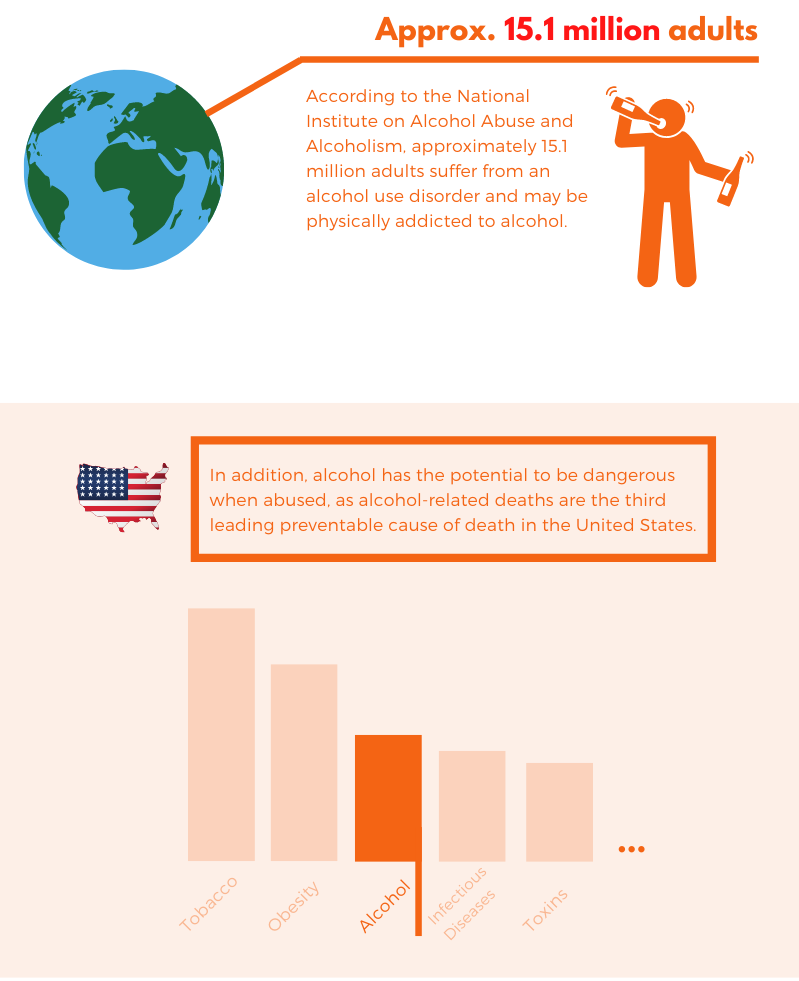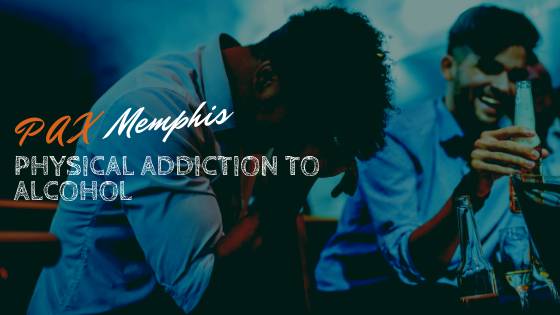Physical Addiction to Alcohol
Alcohol is enjoyed on a regular basis by more than half of American adults aged 18 and older, making alcohol the most widely used addictive substance in the nation.[1] However, while the vast majority of people who drink will be able to do so in a safe manner, there are some people who abuse alcohol and become physically addicted. Of those who develop a physical addiction to alcohol, this addiction can develop over different lengths of time depending on how the individual abuses alcohol. Regardless if physical addiction occurs slowly or rapidly, it is always dangerous to the body.

While alcohol use is popular in both rural and urban areas, it can be especially easy to fall into dangerous drinking habits when city nightlife revolves around drinking like it does in Memphis.
Alcohol Use in Memphis
In Memphis and Shelby County, heavy consumption of alcohol is higher than the average statewide rate.[2] With a variety of exciting nightlife, sporting events, and the ever so popular Beale street, alcohol plays an important role in many activities for adults in the Memphis area. As the drinking scene is constantly prevalent in Memphis, it can be easy to fall into a pattern of heavy drinking. Since heavy alcohol consumption has the potential to turn into a physical addiction, high rates of alcohol consumption in Memphis can be a danger to individuals and the community as a whole.
Alcohol Dependence
When alcohol is consumed, it disrupts chemical balances in the brain that allow the body to function normally. These chemical changes occurring between neurotransmitters are responsible for the euphoric effects of alcohol as well as impaired coordination, drowsiness, and inhibition. Although these effects wear off quickly and the brain begins to function normally again, ongoing alcohol exposure can begin to make complex changes upon the structure and function of the brain.
The brain will begin to adjust to these changes by increasing the activity of the neurotransmitters that heighten arousal, causing the brain and body to begin requiring more and more alcohol to produce the desired effects. As this tolerance builds, drinking tends to increase and eventually, the body will depend on the presence of alcohol to function normally.
Physical addiction is characterized by the occurrence of alcohol withdrawal symptoms when a person doesn’t drink. Often times, undergoing alcohol withdrawal alone can be so unbearable that many will begin to drink again to stop the withdrawals.
Alcohol withdrawal symptoms consist of:
- Shakes and tremors
- Depression, irritability, and anxiety
- Disorientation
- Sweating
- Increased blood pressure
- Increased heart rate
- Headaches
- Auditory or visual hallucinations
- Delusions
- Seizures
These symptoms may become so severe that it becomes incredibly difficult to quit drinking without professional help once alcohol dependence develops. In addition, many of the symptoms of alcohol withdrawal can be dangerous and potentially fatal, making it imperative to seek help from a medical detox instead of going at it alone.
Help for Alcohol Addiction in Memphis
Physical addiction to alcohol can be difficult to overcome alone, but alcohol rehab in Memphis can help. The first step in overcoming a physical addiction to alcohol is by completing detox. Alcohol detox should never be attempted alone, as this will increase the risk of fatal seizures and unfavorable withdrawal symptoms. Instead, alcohol detox in Memphis can aid in the detox process.
The goal of alcohol detox is to provide around the clock care to individuals who have a physical addiction to ensure that the detox process is as safe and comfortable as possible. Medical professionals will be ready to intervene in the event of a medical emergency during detox. To aid individuals during detox, medications can be administered to help alleviate withdrawal symptoms and a supportive community will be prepared to speak with and help clients begin their road to recovery.
“When you choose PAX Memphis Recovery Center as your alcohol treatment facility, you can rest assured your detox will be pain-free because our doctors will provide you with medication that will help eliminate the normal symptoms of alcohol withdrawal.”
After detox, it is best to complete alcohol treatment in order to receive counseling and learn about relapse prevention tools. Without treatment, it can be easy to return to old behaviors that can lead to drinking. Alcohol rehab, on the other hand, can provide individuals with the tools needed to maintain sobriety. Addiction specialists can help guide individuals through early recovery by utilizing group therapy, individual therapy, and behavioral therapies to help clients recognize the underlying symptoms of their alcohol addiction.
Suffering from a physical addiction to alcohol can feel like a hopeless situation, but recovery is possible through alcohol rehab and aftercare. Anyone who wants to overcome their alcohol addiction today should speak with one of our addiction specialists in Memphis to see how alcohol detox and treatment can help them get sober.
Resources
Medically Reviewed: September 25, 2019

All of the information on this page has been reviewed and verified by a certified addiction professional.










